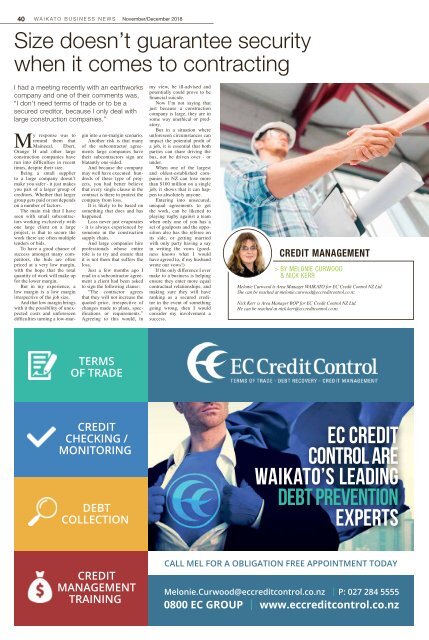Waikato Business News November/December 2018
Waikato Business News has for a quarter of a century been the voice of the region’s business community, a business community with a very real commitment to innovation and an ethos of co-operation.
Waikato Business News has for a quarter of a century been the voice of the region’s business community, a business community with a very real commitment to innovation and an ethos of co-operation.
Create successful ePaper yourself
Turn your PDF publications into a flip-book with our unique Google optimized e-Paper software.
40 WAIKATO BUSINESS NEWS <strong>November</strong>/<strong>December</strong> <strong>2018</strong><br />
Size doesn’t guarantee security<br />
when it comes to contracting<br />
I had a meeting recently with an earthworks<br />
company and one of their comments was,<br />
“I don’t need terms of trade or to be a<br />
secured creditor, because I only deal with<br />
large construction companies.”<br />
My response was to<br />
remind them that<br />
Mainzeal, Ebert,<br />
Orange H and other large<br />
construction companies have<br />
run into difficulties in recent<br />
times, despite their size.<br />
Being a small supplier<br />
to a large company doesn’t<br />
make you safer - it just makes<br />
you part of a larger group of<br />
creditors. Whether that larger<br />
group gets paid or not depends<br />
on a number of factors.<br />
The main risk that I have<br />
seen with small subcontractors<br />
working exclusively with<br />
one large client on a large<br />
project, is that to secure the<br />
work there are often multiple<br />
tenders or bids.<br />
To have a good chance of<br />
success amongst many competitors,<br />
the bids are often<br />
priced at a very low margin,<br />
with the hope that the total<br />
quantity of work will make up<br />
for the lower margin.<br />
But in my experience, a<br />
low margin is a low margin<br />
irrespective of the job size.<br />
And that low margin brings<br />
with it the possibility of unexpected<br />
costs and unforeseen<br />
difficulties turning a low-margin<br />
into a no-margin scenario.<br />
Another risk is that many<br />
of the subcontractor agreements<br />
large companies have<br />
their subcontractors sign are<br />
blatantly one-sided.<br />
And because the company<br />
may well have executed hundreds<br />
of these type of projects,<br />
you had better believe<br />
that every single clause in the<br />
contract is there to protect the<br />
company from loss.<br />
It is likely to be based on<br />
something that does and has<br />
happened.<br />
Loss never just evaporates<br />
- it is always experienced by<br />
someone in the construction<br />
supply chain.<br />
And large companies hire<br />
professionals whose entire<br />
role is to try and ensure that<br />
it is not them that suffers the<br />
loss.<br />
Just a few months ago I<br />
read in a subcontractor agreement<br />
a client had been asked<br />
to sign the following clause:<br />
“The contractor agrees<br />
that they will not increase the<br />
quoted price, irrespective of<br />
changes made to plans, specifications<br />
or requirements.”<br />
Agreeing to this would, in<br />
my view, be ill-advised and<br />
potentially could prove to be<br />
financial suicide.<br />
Now I’m not saying that<br />
just because a construction<br />
company is large, they are in<br />
some way unethical or predatory.<br />
But in a situation where<br />
unforeseen circumstances can<br />
impact the potential profit of<br />
a job, it is essential that both<br />
parties can share driving the<br />
bus, not be driven over - or<br />
under.<br />
When one of the largest<br />
and oldest-established companies<br />
in NZ can lose more<br />
than $100 million on a single<br />
job, it shows that it can happen<br />
to absolutely anyone.<br />
Entering into unsecured,<br />
unequal agreements to get<br />
the work, can be likened to<br />
playing rugby against a team<br />
when only one of you has a<br />
set of goalposts and the opposition<br />
also has the referee on<br />
its side, or getting married<br />
with only party having a say<br />
in writing the vows (goodness<br />
knows what I would<br />
have agreed to, if my husband<br />
wrote our vows!)<br />
If the only difference I ever<br />
make to a business is helping<br />
ensure they enter more equal<br />
contractual relationships, and<br />
making sure they will have<br />
ranking as a secured creditor<br />
in the event of something<br />
going wrong, then I would<br />
consider my involvement a<br />
success.<br />
CREDIT MANAGEMENT<br />
> BY MELONIE CURWOOD<br />
& NICK KERR<br />
Melonie Curwood is Area Manager WAIKATO for EC Credit Control NZ Ltd.<br />
She can be reached at melonie.curwood@eccreditcontrol.co.nz<br />
Nick Kerr is Area Manager BOP for EC Credit Control NZ Ltd.<br />
He can be reached at nick.kerr@eccreditcontrol.co.nz<br />
TERMS<br />
OF TRADE<br />
CREDIT<br />
CHECKING /<br />
MONITORING<br />
DEBT<br />
COLLECTION<br />
EC Credit<br />
Control are<br />
<strong>Waikato</strong>’s leading<br />
debt prevention<br />
experts<br />
CREDIT<br />
MANAGEMENT<br />
TRAINING<br />
CALL MEL FOR A OBLIGATION FREE APPOINTMENT TODAY<br />
Melonie.Curwood@eccreditcontrol.co.nz | P: 027 284 5555<br />
0800 EC GROUP | www.eccreditcontrol.co.nz


















